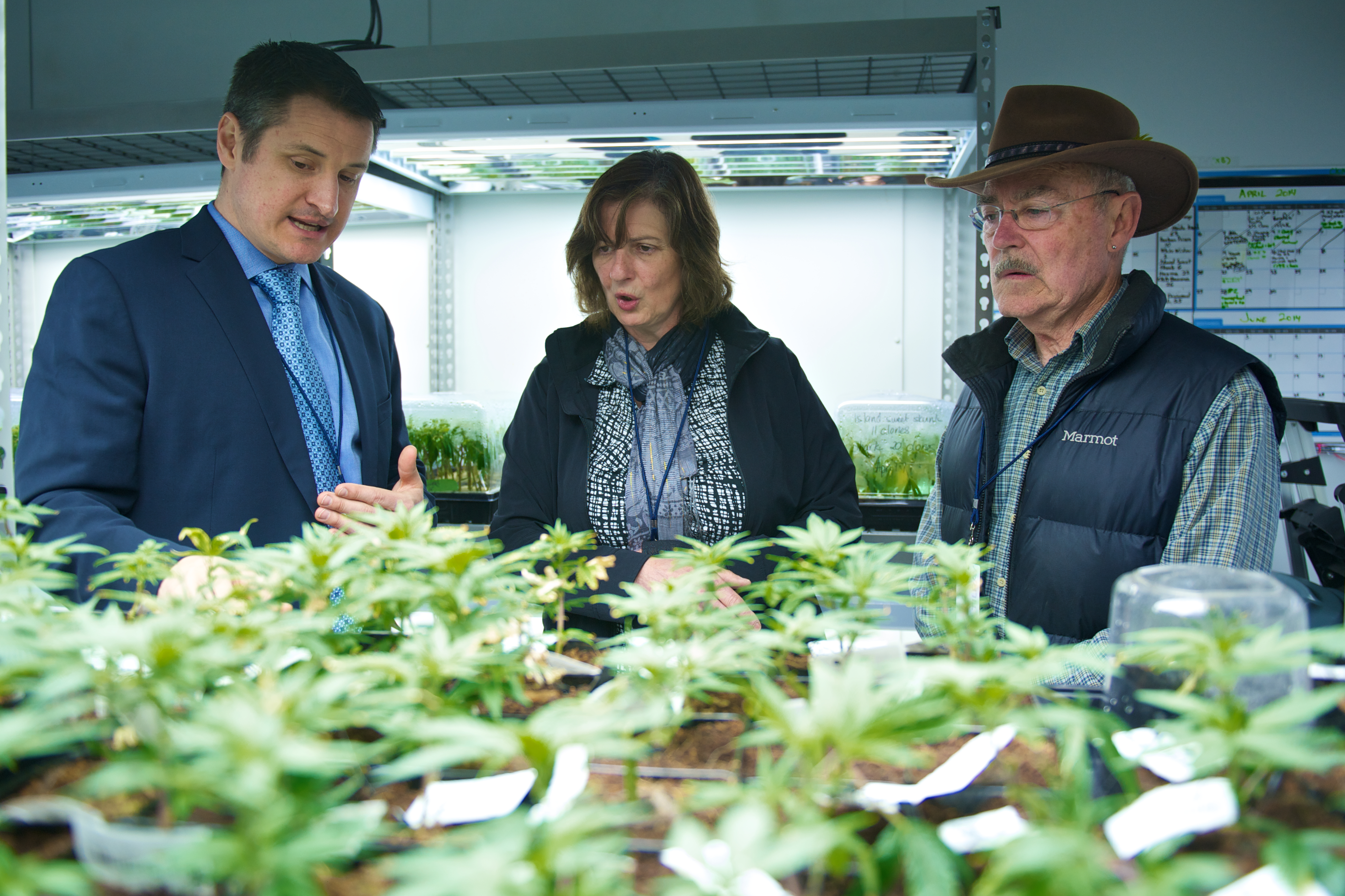It’s been quite the journey for cannabis-focused private equity firm Privateer Holdings. Founded in 2010, it was the first PE fund to make an investment in the cannabis sector when it acquired Leafly, the online cannabis information site in 2011. It also broke records when it raised a $7 million Series A in 2013 and a $75 million Series B including a commitment from Founders Fund, PayPal founder Peter Thiel’s fund.
Since then it’s established Tilray, a medical cannabis producer and international distributor with a $30 million federally-licensed indoor agriculture facility in British Columbia, Canada, and Marley Natural, the lifestyle brand it launched with Bob Marley’s family.
Cannabis is now legalized for medical purposes in 24 US states and is recreationally legal in four states with at least five more states considering the latter this year. Internationally Canada, Spain, Germany, and Israel are also making strides towards legalization.
AgFunderNews caught up with Brendan Kennedy, CEO of Privateer, to talk about international ambitions, raising capital, and focusing on cannabis brands.
While there are a growing number of US states where cannabis consumption is legal medically and even recreationally, it’s still illegal at the federal level. How does this impact your operations, particularly on a global and interstate level?
It’s important to remember that attitudes toward cannabis aren’t just changing in the United States. They’re changing internationally, and that’s where some of the most interesting opportunities exist. We have raised capital from investors all around the world, and in Canada, we have a medical cannabis production facility under our Tilray brand. Tilray distributes cannabis across Canada, which has had a medical system in place for over a decade, and also ships cannabis internationally, primarily for commercial purposes. Government agencies, research universities, and pharmaceutical distributors are all interested in purchasing cannabis. We have a range of different import permits for different countries, and there is no conflict between state and federal law.
Banking is a huge issue for most companies, and also for some institutional investors, but it isn’t for Tilray because medical cannabis is legal in Canada and our production facility has a federal license from Health Canada to operate.
Marley Natural is our cannabis lifestyle brand, but just one of its product lines is cannabis, and that’s only available in California for now. When Marley Natural expands to other states, we have a compliance team that is really different from anything in the industry. Our general counsel used to work in the Drug Enforcement Agency and Department of Justice, and we just hired someone from the Federal Reserve Bank of San Francisco to manage all our banking compliance issues.
It’s also worth pointing out that roughly 85% of Americans believe medical cannabis should be legal if prescribed by a doctor, and 61% believe it should be legalized, taxed and regulated similarly to alcohol and tobacco. Those numbers keep going up each year, and no one seriously doubts that cannabis prohibition will come to an end. It’s just a matter of time and demographics. We now live in a world where the majority of Americans live in a state with some form of legalized medical cannabis.
And internationally, with the recent election of Justin Trudeau in Canada, we expect Canada to be the first country with a nationwide program for the recreational use of cannabis. Germany will be the second, and Italy will be the third.
As I said, there’s a worldwide shift in consciousness going on, so it’s a fascinating time to be in the industry, especially with the upcoming US presidential election when I think the two candidates will have to have more progressive views on ending prohibition, especially if they want to bring out younger voters. And all of these changes will make it easier for cannabis companies to operate and less intimidating for investors to enter the space.
Where does Tilray export to?
Outside of Canada, we have signed agreements with governments, research institutions and commercial partners in Australia, Croatia, the Czech Republic, and Spain. We’re one of the only providers of standardized, pharmaceutical-grade cannabis-derived medicines in the world. So there’s a massive demand from researchers globally to conduct research around this product. And of course within Canada, we’re proud to provide medical cannabis to thousands of patients across the country.
What are the main differences between how you operate in the US and in the global market? And what’s the competitive landscape like?
There’s an experiment in democracy taking place on a state-by-state basis in the US, and similarly, we’re seeing that experiment at the global level. I don’t think there’s a one size fits all solution. I think that if Canada has its own unique perspective and unique social, cultural and legal history, what works there might be different than what works for Australia or Israel or Germany. In each market, we make every effort to be sensitive to the particular cultural and social dynamics surrounding cannabis that might exist there.
We have 250 full-time employees across six US states, Canada, Australia, Spain, Germany and the Czech Republic. In Australia, for example, we’re a global leader in the industry, and we have the ability to operate in compliance with the most restrictive regulations. We’re conducting a clinical research project in Australia related to chemotherapy-induced nausea with the government of New South Wales. Projects like this give us a head start in terms of momentum, and our global footprint means we have a huge advantage over local players as well as significant access to global capital, which is unique in the sector.
How do you have this global capital access that others don’t?
Our investors come from all over the world and every point on the political spectrum. They’re looking for a financial return, but they’re also looking for a social return, whether that’s helping sick patients gain access to cannabis-derived medicines or reducing the drug war violence in Latin America that’s associated with prohibition.
Our professionalism, global experience, and strategic discipline are what distinguishes us from other companies in the industry, which is why we’ve had such a positive response from investors. Other players in the industry haven’t invested the time, energy and resources we have in traveling the world learning about the industry in different markets and in building such a world-class team.
How would you categorize your brands and the opportunities that lie ahead for Privateer?
There are probably three different segments of the market — medical, wellness, and recreational — and we think there are massive opportunities in all three. Often brands can span multiple segments. For example, Tilray serves both wellness and medical patients. Meanwhile, Marley Natural serves recreational and wellness consumers, and also some medical patients.
One of the notable things about a brand like Leafly, our cannabis information website, and app, is that it can be used by any kind of cannabis consumer, whether they’re a medical patient looking for strains with certain effects or they’re a recreational consumer living somewhere like Washington State. The fact that Leafly has nearly 9 million visits per month is a testament to its wide appeal across demographics.
We have a great pipeline of opportunities, and it’s about throwing more fuel on the fire, to grow bigger, faster, as well as looking at the industry from a branding segmentation perspective. We are looking at any unaddressed consumers, so maybe the baby boomers or women are looking for an aspirational premium brand. We will acquire some brands, and others we will create on our own. It’s extremely likely that we will build more brands in-house using our robust branding and marketing team.
Are you planning to raise more funding any time soon?
Yes. We had a few investors who were interested in investing more, and that started off our current fundraise. We were also approached by some large institutional investors who were really interested in placing investment capital in the industry, so we’re raising capital in two phases: one shorter term convertible note for the smaller investors, and then a Series C round for the larger institutional investors.
Where do agtech companies fit into all of this?
Technology investments themselves don’t necessarily intrigue us. It’s our fundamental thesis that cannabis is a mainstream product that will be consumed by mainstream consumers when prohibition ends. Brands will shape the future of this industry, and while I appreciate technology and understand why people are investing in it, our focus is really on investing in consumer brands; that’s the piece we’re really interested in owning. That said, you could argue that Leafly is one of the leading technology companies operating in the industry today and the same for Tilray since the company is developing and fine-tuning rigorous production and processing methods rooted in scientific and engineering principles.
Yes, Tilray must have a lot of technology involved in its production assets?
Tilray has a unique facility in Canada which we built with two purposes in mind: to understand the different variables in the production of cannabis, and to be able to get into international markets with our pharmaceutical-grade product. We want to understand how to best grow different varieties of cannabis, so that when we build or license a second facility, we will have more data and information about the plants than its currently available anywhere else.
But ultimately we’re not interested in being farmers, and in the US there is an abundance of cannabis in various states we can source from. We expect other countries will increasingly have sourcing options for us. For Marley Natural’s in California, for instance, we source our cannabis from local farmers, particularly in Northern California, which lets us support smaller growers and draw on their expertise.
That’s not to say technology isn’t hugely important to this industry; it just means we want to focus on building recognizable, trusted, mainstream consumer-facing brands. That’s where the strengths of our team lie, and that’s really our mission going forward.
Have news or tips? Email [email protected].





